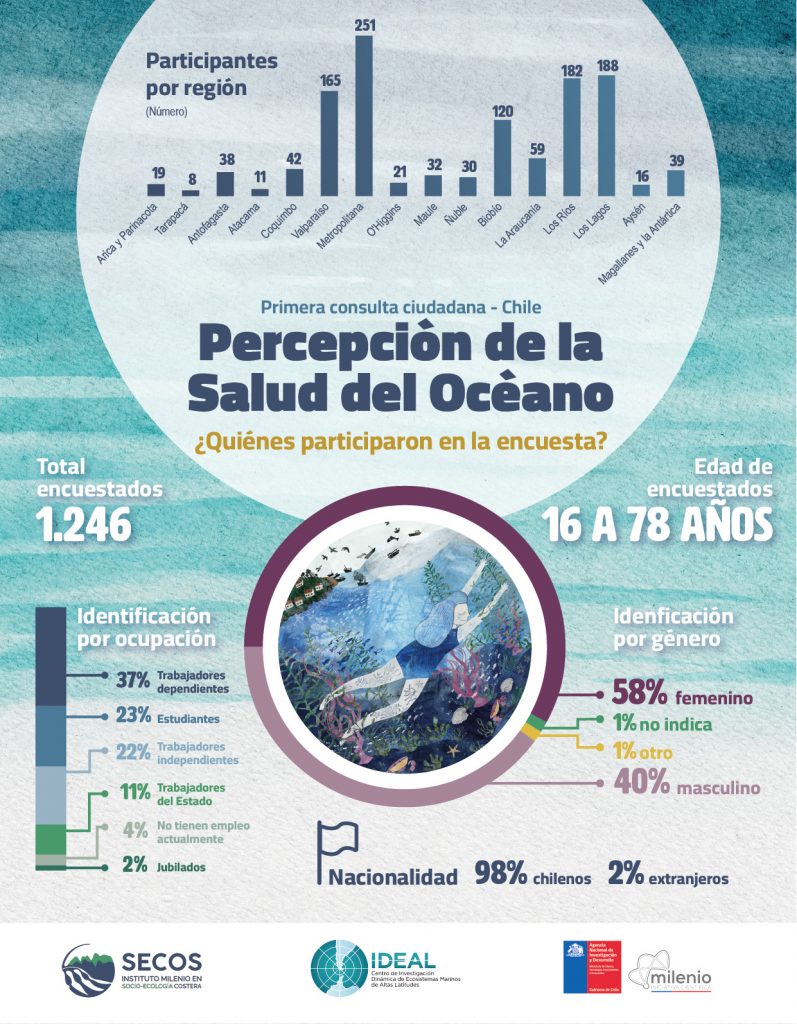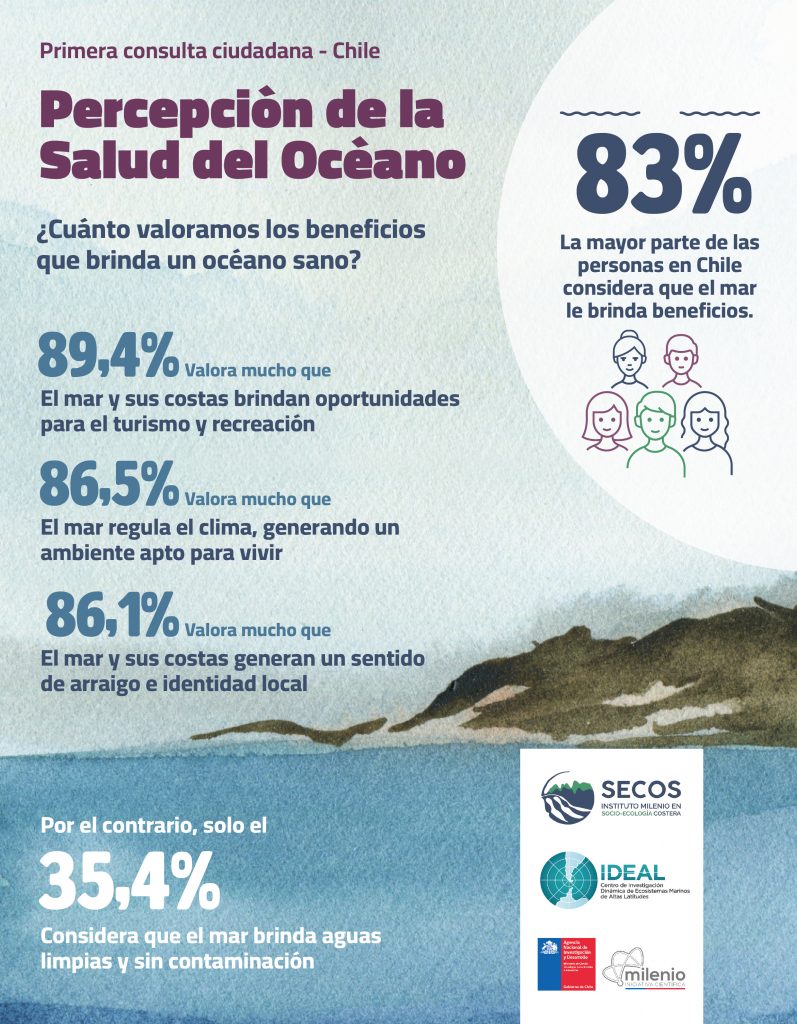
03 Aug Citizen consultation reveals Chileans’ perception of ocean health
The study conducted by the IDEAL Center and the SECOS Millennium Institute, shows how chilean citizens relate to marine ecosystems and how they perceive the ocean’s health from their territories. The results reveal a close relationship between the perception of a healthy ocean and the happiness of those surveyed, in addition to a high valuation of the benefits that the ocean provides. They also point to industries and people as those who most harm the ocean’s health.
This survey will contribute to the construction of the first Ocean Health Index in the country, an international instrument to monitor the condition of the oceans and the actions taken by nations to achieve the Sustainable Development Goals.
Chile is the fourth country in the world with the longest coastal zones, spanning 6,435 km. A significant portion of the nation’s productive activity is tied to the resources provided by the Pacific Ocean, making it a fundamental part of life for millions of people. However, little is known about how Chileans perceive the health of the ocean.
To better understand this perspective, the Center for the Dynamics of High Latitude Marine Ecosystems (IDEAL) at the Austral University of Chile (UACh) and the Millennium Institute for Coastal Socio-Ecology (SECOS) launched the first national public consultation on Ocean Health. This initiative gathered the opinions of 1,246 individuals between the ages of 16 and 78 from all regions of the country. Conducted between January and April of this year, the consultation aimed to understand how citizens relate to the marine-coastal space, how they perceive ocean health, what threats they recognize to it, and how they link the ocean’s condition to their own well-being.
“The results of this public consultation will enable the development of the Ocean Health Index for Chile—a scientific assessment framework used internationally to measure ocean health through ten indicators and already applied in various countries,” explains Laura Nahuelhual, coordinator of the initiative and researcher at the IDEAL Center, Austral University of Chile (UACh), and the Millennium Institute SECOS. Using this methodology, it is possible to carry out periodic evaluations of the health of Chile’s oceans, incorporating the pressures on marine ecosystems, their current state, and their resilience.
Ultimately, this index is used to monitor the actions that improve or worsen the health of the ocean in the assessed areas over time. “In recent years, research on public perceptions has gained importance in marine sciences and decision-making, as societal behavior change has the potential to reduce pressures on marine and coastal ecosystems. Several studies reveal that public engagement and acceptance, as well as participatory governance, play a key role in advancing marine conservation and restoration programs. For this reason, understanding how the public perceives and relates to the ocean is fundamental to the success of social engagement, the integration of human dimensions in ocean conservation, and the achievement of sustainable development goals,” the researcher adds.
¿What the ocean represents to Chileans?
Those who participated in the initiative were invited to express what the ocean means to them through three key concepts. Overall, Chileans perceive the ocean as representing life (17%), tranquility (7%), peace (5%), beauty (3%), vastness (3%), freedom (3%), food (3%), and diversity (3%). The vast majority of participants (83.1%) believe that the ocean provides them with benefits. In that sense, according to the results, from a list of ten benefits provided by a healthy ocean, the most highly valued were: opportunities for tourism and recreation (89.4%); climate regulation, which creates a livable environment (86.5%); and a sense of belonging and local identity (86.1%). Finally, 95% of Chilean residents believe that a healthy ocean contributes greatly to their happiness.
“These responses suggest a significant level of human dependence on ocean health. It’s not just that the ocean provides certain resources—it also symbolizes survival for humans and other species, in addition to contributing to subjective well-being, represented by individual peace and tranquility. In a fast-paced world like the one we live in today, the results seem to indicate that interaction with a healthy ocean is an important component of quality of life for people in Chile,” explains Laura Nahuelhual.
Present Ocean Health in Chile
Those who participated in the initiative were invited to express what the ocean means to them through three key concepts. Overall, Chileans perceive the ocean as representing life (17%), tranquility (7%), peace (5%), beauty (3%), vastness (3%), freedom (3%), food (3%), and diversity (3%). The vast majority of participants (83.1%) believe that the ocean provides them with benefits. In that sense, according to the results, from a list of ten benefits provided by a healthy ocean, the most highly valued were: opportunities for tourism and recreation (89.4%); climate regulation, which creates a livable environment (86.5%); and a sense of belonging and local identity (86.1%). Finally, 95% of Chilean residents believe that a healthy ocean contributes greatly to their happiness.
“These responses suggest a significant level of human dependence on ocean health. It’s not just that the ocean provides certain resources—it also symbolizes survival for humans and other species, in addition to contributing to subjective well-being, represented by individual peace and tranquility. In a fast-paced world like the one we live in today, the results seem to indicate that interaction with a healthy ocean is an important component of quality of life for people in Chile,” explains Laura Nahuelhual.
¿Which coastal areas would be healthier and which damaged?
Another section of the survey focused on how coastal cities are associated with the concepts of a “healthy” or “damaged” ocean. The results showed that the beaches and coastlines of the communes of Antarctica and Cabo de Hornos, Punta Arenas, La Higuera, Valdivia, and Caldera are frequently associated with a healthy ocean. In contrast, localities in the communes of Quintero, Puerto Montt, Valparaíso, Puchuncaví, Coronel, and Talcahuano were more frequently associated with a damaged ocean.
“The areas mentioned as healthy, according to the respondents, are mainly isolated zones or areas with low human population and less industrial activity—far from such negative experiences. These include southern regions like Antarctica, Cabo de Hornos, and Punta Arenas; the north-central region such as La Higuera and Caldera; or places recognized for their tourism value or quality of life, like Valdivia. These results suggest a negative relationship between human presence and ocean health,” explains Campos. When it comes to the perception of a damaged ocean, survey participants primarily blamed companies or industries (33.5%) and individuals (31.5%) for the problems affecting Chile’s coastlines.
The consultation also revealed that the greatest threats to the ocean—regardless of location—are household waste (25.3%), pathogens or excess nutrients (20.1%), chemicals (16.2%), and industrial waste (16%). “Achieving the goal of a healthy ocean is a shared responsibility, and according to the opinions we gathered, certain actions to maintain ocean health clearly fall on both individual behavior and corporate practices. Actions by individuals, businesses, or the State regarding ocean health must be planned in the short, medium, and long term, and should be tailored to the specific needs of each territory and the characteristics of each coastal zone.
The reasons the ocean is damaged vary across the country, and therefore, responses should also be differentiated,” concludes Laura Nahuelhual, professor in the Department of Economics at UACh and researcher at the Transdisciplinary Center for Environmental Studies and Sustainable Human Development (CEAM-UACh).
¡Revisa las infografías con los principales resultados de la consulta ciudadana!






